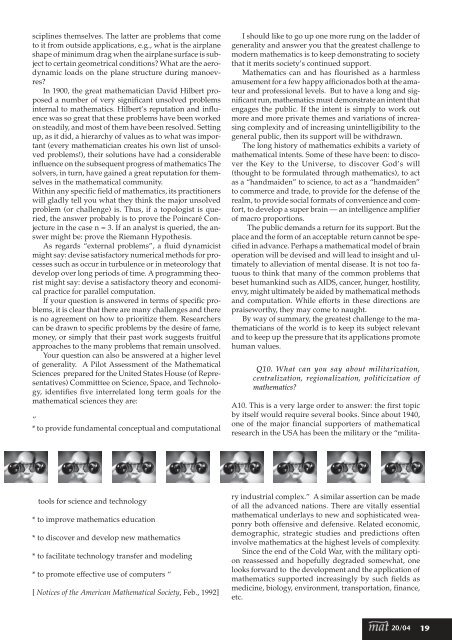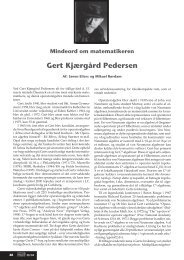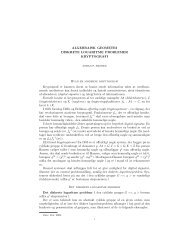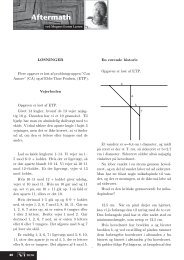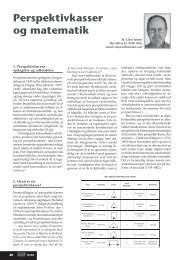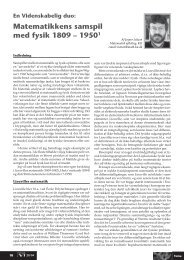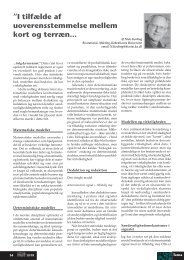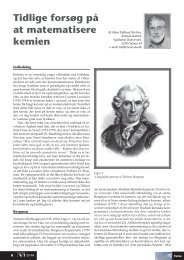MAT 15 - Matilde - Dansk Matematisk Forening
MAT 15 - Matilde - Dansk Matematisk Forening
MAT 15 - Matilde - Dansk Matematisk Forening
Create successful ePaper yourself
Turn your PDF publications into a flip-book with our unique Google optimized e-Paper software.
sciplines themselves. The latter are problems that come<br />
to it from outside applications, e.g., what is the airplane<br />
shape of minimum drag when the airplane surface is subject<br />
to certain geometrical conditions? What are the aerodynamic<br />
loads on the plane structure during manoevres?<br />
In 1900, the great mathematician David Hilbert proposed<br />
a number of very significant unsolved problems<br />
internal to mathematics. Hilbert’s reputation and influence<br />
was so great that these problems have been worked<br />
on steadily, and most of them have been resolved. Setting<br />
up, as it did, a hierarchy of values as to what was important<br />
(every mathematician creates his own list of unsolved<br />
problems!), their solutions have had a considerable<br />
influence on the subsequent progress of mathematics The<br />
solvers, in turn, have gained a great reputation for themselves<br />
in the mathematical community.<br />
Within any specific field of mathematics, its practitioners<br />
will gladly tell you what they think the major unsolved<br />
problem (or challenge) is. Thus, if a topologist is queried,<br />
the answer probably is to prove the Poincaré Conjecture<br />
in the case n = 3. If an analyst is queried, the answer<br />
might be: prove the Riemann Hypothesis.<br />
As regards “external problems”, a fluid dynamicist<br />
might say: devise satisfactory numerical methods for processes<br />
such as occur in turbulence or in meteorology that<br />
develop over long periods of time. A programming theorist<br />
might say: devise a satisfactory theory and economical<br />
practice for parallel computation.<br />
If your question is answered in terms of specific problems,<br />
it is clear that there are many challenges and there<br />
is no agreement on how to prioritize them. Researchers<br />
can be drawn to specific problems by the desire of fame,<br />
money, or simply that their past work suggests fruitful<br />
approaches to the many problems that remain unsolved.<br />
Your question can also be answered at a higher level<br />
of generality. A Pilot Assessment of the Mathematical<br />
Sciences prepared for the United States House (of Representatives)<br />
Committtee on Science, Space, and Technology,<br />
identifies five interrelated long term goals for the<br />
mathematical sciences they are:<br />
“<br />
* to provide fundamental conceptual and computational<br />
tools for science and technology<br />
* to improve mathematics education<br />
* to discover and develop new mathematics<br />
* to facilitate technology transfer and modeling<br />
* to promote effective use of computers “<br />
[ Notices of the American Mathematical Society, Feb., 1992]<br />
I should like to go up one more rung on the ladder of<br />
generality and answer you that the greatest challenge to<br />
modern mathematics is to keep demonstrating to society<br />
that it merits society’s continued support.<br />
Mathematics can and has flourished as a harmless<br />
amusement for a few happy afficionados both at the amateur<br />
and professional levels. But to have a long and significant<br />
run, mathematics must demonstrate an intent that<br />
engages the public. If the intent is simply to work out<br />
more and more private themes and variations of increasing<br />
complexity and of increasing unintelligibility to the<br />
general public, then its support will be withdrawn.<br />
The long history of mathematics exhibits a variety of<br />
mathematical intents. Some of these have been: to discover<br />
the Key to the Universe, to discover God’s will<br />
(thought to be formulated through mathematics), to act<br />
as a “handmaiden” to science, to act as a “handmaiden”<br />
to commerce and trade, to provide for the defense of the<br />
realm, to provide social formats of convenience and comfort,<br />
to develop a super brain — an intelligence amplifier<br />
of macro proportions.<br />
The public demands a return for its support. But the<br />
place and the form of an acceptable return cannot be specified<br />
in advance. Perhaps a mathematical model of brain<br />
operation will be devised and will lead to insight and ultimately<br />
to alleviation of mental disease. It is not too fatuous<br />
to think that many of the common problems that<br />
beset humankind such as AIDS, cancer, hunger, hostility,<br />
envy, might ultimately be aided by mathematical methods<br />
and computation. While efforts in these directions are<br />
praiseworthy, they may come to naught.<br />
By way of summary, the greatest challenge to the mathematicians<br />
of the world is to keep its subject relevant<br />
and to keep up the pressure that its applications promote<br />
human values.<br />
Q10. What can you say about militarization,<br />
centralization, regionalization, politicization of<br />
mathematics?<br />
A10. This is a very large order to answer: the first topic<br />
by itself would require several books. Since about 1940,<br />
one of the major financial supporters of mathematical<br />
research in the USA has been the military or the “milita-<br />
ry industrial complex.” A similar assertion can be made<br />
of all the advanced nations. There are vitally essential<br />
mathematical underlays to new and sophisticated weaponry<br />
both offensive and defensive. Related economic,<br />
demographic, strategic studies and predictions often<br />
involve mathematics at the highest levels of complexity.<br />
Since the end of the Cold War, with the military option<br />
reassessed and hopefully degraded somewhat, one<br />
looks forward to the development and the application of<br />
mathematics supported increasingly by such fields as<br />
medicine, biology, environment, transportation, finance,<br />
etc.<br />
20/04<br />
19


